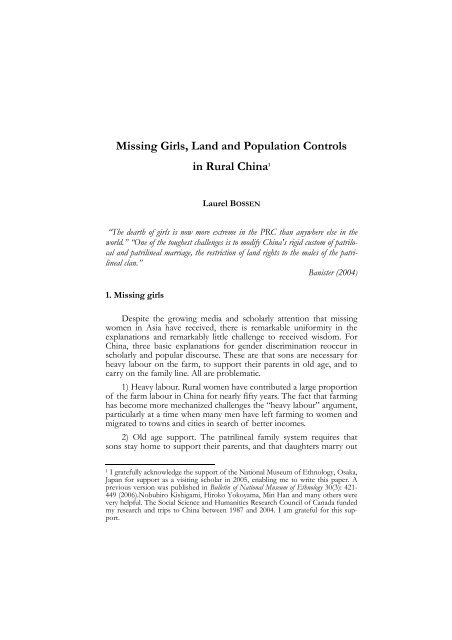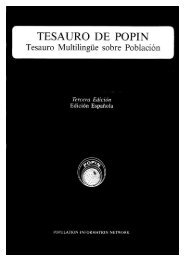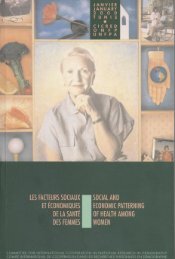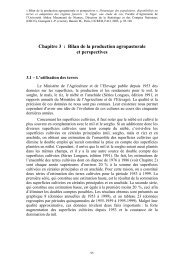- Page 1:
WATERING THE NEIGHBOUR’S GARDEN:
- Page 4 and 5:
Chapters in this volume originate f
- Page 7 and 8:
List of Authors Sutapa AGRAWAL is P
- Page 9 and 10:
Foreword The rampant demographic ma
- Page 11 and 12:
TABLE OF CONTENTS Introduction Isab
- Page 13 and 14:
Introduction Isabelle ATTANÉ and C
- Page 15 and 16:
INTRODUCTION 3 point to an unexpect
- Page 17 and 18:
INTRODUCTION 5 women to avoid unwan
- Page 19 and 20:
INTRODUCTION 7 to estimate the cont
- Page 21 and 22:
INTRODUCTION 9 a feature common amo
- Page 23 and 24:
INTRODUCTION 11 women and may in tu
- Page 25 and 26:
INTRODUCTION 13 covering other regi
- Page 27 and 28:
INTRODUCTION 15 ratio at birth. Tha
- Page 29 and 30:
INTRODUCTION 17 Figure 2 Research l
- Page 31 and 32:
INTRODUCTION 19 This is no doubt an
- Page 33 and 34:
INTRODUCTION 21 References ATTANÉ
- Page 35:
Part I RECENT TRENDS IN SEX RATIO I
- Page 38 and 39:
26 LI S.-WEI Y.- JIANG Q. - M. W. F
- Page 40 and 41:
28 LI S.-WEI Y.- JIANG Q. - M. W. F
- Page 42 and 43:
30 LI S.-WEI Y.- JIANG Q. - M. W. F
- Page 44 and 45:
32 LI S.-WEI Y.- JIANG Q. - M. W. F
- Page 46 and 47:
34 LI S.-WEI Y.- JIANG Q. - M. W. F
- Page 48 and 49:
36 LI S.-WEI Y.- JIANG Q. - M. W. F
- Page 50 and 51:
38 LI S.-WEI Y.- JIANG Q. - M. W. F
- Page 52 and 53:
40 LI S.-WEI Y.- JIANG Q. - M. W. F
- Page 54 and 55:
42 LI S.-WEI Y.- JIANG Q. - M. W. F
- Page 56 and 57:
44 LI S.-WEI Y.- JIANG Q. - M. W. F
- Page 58 and 59:
46 LI S.-WEI Y.- JIANG Q. - M. W. F
- Page 61 and 62:
Sex Ratio at Birth and Excess Femal
- Page 63 and 64:
SEX RATIO AT BIRTH AND EXCESS FEMAL
- Page 65 and 66:
SEX RATIO AT BIRTH AND EXCESS FEMAL
- Page 67 and 68:
SEX RATIO AT BIRTH AND EXCESS FEMAL
- Page 69 and 70:
SEX RATIO AT BIRTH AND EXCESS FEMAL
- Page 71 and 72:
SEX RATIO AT BIRTH AND EXCESS FEMAL
- Page 73 and 74:
SEX RATIO AT BIRTH AND EXCESS FEMAL
- Page 75 and 76:
SEX RATIO AT BIRTH AND EXCESS FEMAL
- Page 77 and 78:
SEX RATIO AT BIRTH AND EXCESS FEMAL
- Page 79 and 80:
SEX RATIO AT BIRTH AND EXCESS FEMAL
- Page 81 and 82:
SEX RATIO AT BIRTH AND EXCESS FEMAL
- Page 83 and 84:
SEX RATIO AT BIRTH AND EXCESS FEMAL
- Page 85 and 86:
A Sharp Increase in Sex Ratio at Bi
- Page 87 and 88:
A SHARP INCREASE IN SEX RATIO AT BI
- Page 89 and 90:
A SHARP INCREASE IN SEX RATIO AT BI
- Page 91 and 92:
A SHARP INCREASE IN SEX RATIO AT BI
- Page 93 and 94:
A SHARP INCREASE IN SEX RATIO AT BI
- Page 95 and 96:
A SHARP INCREASE IN SEX RATIO AT BI
- Page 97 and 98:
A SHARP INCREASE IN SEX RATIO AT BI
- Page 99 and 100:
A SHARP INCREASE IN SEX RATIO AT BI
- Page 101 and 102:
Son Preference, Female Deficit and
- Page 103 and 104:
SON PREFERENCE, FEMALE DEFICIT… 2
- Page 105 and 106:
SON PREFERENCE, FEMALE DEFICIT… e
- Page 107 and 108:
SON PREFERENCE, FEMALE DEFICIT… F
- Page 109 and 110:
SON PREFERENCE, FEMALE DEFICIT… A
- Page 111 and 112:
SON PREFERENCE, FEMALE DEFICIT… b
- Page 113 and 114:
SON PREFERENCE, FEMALE DEFICIT… e
- Page 115 and 116:
SON PREFERENCE, FEMALE DEFICIT… r
- Page 117 and 118:
SON PREFERENCE, FEMALE DEFICIT… R
- Page 119:
Part II DIFFERENTIALS IN DISCRIMINA
- Page 122 and 123:
110 C.Z. GUILMOTO - I. ATTANÉ gap
- Page 124 and 125:
112 C.Z. GUILMOTO - I. ATTANÉ rise
- Page 126 and 127:
114 C.Z. GUILMOTO - I. ATTANÉ only
- Page 128 and 129:
116 C.Z. GUILMOTO - I. ATTANÉ adva
- Page 130 and 131:
118 C.Z. GUILMOTO - I. ATTANÉ nomi
- Page 132 and 133:
120 C.Z. GUILMOTO - I. ATTANÉ chil
- Page 134 and 135:
122 C.Z. GUILMOTO - I. ATTANÉ Figu
- Page 136 and 137:
124 C.Z. GUILMOTO - I. ATTANÉ incr
- Page 138 and 139:
126 C.Z. GUILMOTO - I. ATTANÉ itse
- Page 140 and 141:
128 C.Z. GUILMOTO - I. ATTANÉ patr
- Page 143 and 144:
1. Introduction Factors Influencing
- Page 145 and 146:
FACTORS INFLUENCING THE USE OF PREN
- Page 147 and 148:
FACTORS INFLUENCING THE USE OF PREN
- Page 149 and 150:
FACTORS INFLUENCING THE USE OF PREN
- Page 151 and 152:
FACTORS INFLUENCING THE USE OF PREN
- Page 153 and 154:
FACTORS INFLUENCING THE USE OF PREN
- Page 155 and 156:
FACTORS INFLUENCING THE USE OF PREN
- Page 157 and 158:
FACTORS INFLUENCING THE USE OF PREN
- Page 159 and 160:
FACTORS INFLUENCING THE USE OF PREN
- Page 161 and 162:
FACTORS INFLUENCING THE USE OF PREN
- Page 163 and 164:
FACTORS INFLUENCING THE USE OF PREN
- Page 165 and 166:
FACTORS INFLUENCING THE USE OF PREN
- Page 167 and 168: FACTORS INFLUENCING THE USE OF PREN
- Page 169 and 170: FACTORS INFLUENCING THE USE OF PREN
- Page 171 and 172: FACTORS INFLUENCING THE USE OF PREN
- Page 173 and 174: Decreases in Male and Female Mortal
- Page 175 and 176: DECREASES IN MALE AND FEMALE MORTAL
- Page 177 and 178: DECREASES IN MALE AND FEMALE MORTAL
- Page 179 and 180: DECREASES IN MALE AND FEMALE MORTAL
- Page 181 and 182: DECREASES IN MALE AND FEMALE MORTAL
- Page 183 and 184: DECREASES IN MALE AND FEMALE MORTAL
- Page 185 and 186: DECREASES IN MALE AND FEMALE MORTAL
- Page 187 and 188: DECREASES IN MALE AND FEMALE MORTAL
- Page 189 and 190: DECREASES IN MALE AND FEMALE MORTAL
- Page 191 and 192: DECREASES IN MALE AND FEMALE MORTAL
- Page 193: DECREASES IN MALE AND FEMALE MORTAL
- Page 196 and 197: 184 KIM D.S. -SONG Y.J. birth at hi
- Page 198 and 199: 186 KIM D.S. -SONG Y.J. trance exam
- Page 200 and 201: 188 KIM D.S. -SONG Y.J. and on its
- Page 202 and 203: 190 KIM D.S. -SONG Y.J. striking. W
- Page 204 and 205: 192 KIM D.S. -SONG Y.J. Table 1 Sex
- Page 206 and 207: 194 KIM D.S. -SONG Y.J. maintained
- Page 208 and 209: 196 KIM D.S. -SONG Y.J. ritual is t
- Page 210 and 211: 198 KIM D.S. -SONG Y.J. and educati
- Page 212 and 213: 200 KIM D.S. -SONG Y.J. dents in ea
- Page 214 and 215: 202 KIM D.S. -SONG Y.J. behaviour i
- Page 217: Part III LOCAL PERSPECTIVES ON GEND
- Page 221 and 222: MISSING GIRLS, LAND AND POPULATION
- Page 223 and 224: MISSING GIRLS, LAND AND POPULATION
- Page 225 and 226: MISSING GIRLS, LAND AND POPULATION
- Page 227 and 228: MISSING GIRLS, LAND AND POPULATION
- Page 229 and 230: MISSING GIRLS, LAND AND POPULATION
- Page 231 and 232: MISSING GIRLS, LAND AND POPULATION
- Page 233 and 234: MISSING GIRLS, LAND AND POPULATION
- Page 235 and 236: MISSING GIRLS, LAND AND POPULATION
- Page 237 and 238: MISSING GIRLS, LAND AND POPULATION
- Page 239 and 240: MISSING GIRLS, LAND AND POPULATION
- Page 241 and 242: Social Networks and Son Preference
- Page 243 and 244: SOCIAL NETWORKS AND SON PREFERENCE
- Page 245 and 246: SOCIAL NETWORKS AND SON PREFERENCE
- Page 247 and 248: SOCIAL NETWORKS AND SON PREFERENCE
- Page 249 and 250: SOCIAL NETWORKS AND SON PREFERENCE
- Page 251 and 252: SOCIAL NETWORKS AND SON PREFERENCE
- Page 253 and 254: SOCIAL NETWORKS AND SON PREFERENCE
- Page 255 and 256: SOCIAL NETWORKS AND SON PREFERENCE
- Page 257: SOCIAL NETWORKS AND SON PREFERENCE
- Page 260 and 261: 248 S. AGRAWAL - S. UNISA the use o
- Page 262 and 263: 250 S. AGRAWAL - S. UNISA was assum
- Page 264 and 265: 252 S. AGRAWAL - S. UNISA other two
- Page 266 and 267: 254 S. AGRAWAL - S. UNISA significa
- Page 268 and 269:
256 S. AGRAWAL - S. UNISA women’s
- Page 270 and 271:
258 S. AGRAWAL - S. UNISA of women
- Page 272 and 273:
260 S. AGRAWAL - S. UNISA erwise li
- Page 274 and 275:
262 S. AGRAWAL - S. UNISA socioecon
- Page 276 and 277:
264 S. AGRAWAL - S. UNISA higher de
- Page 278 and 279:
266 S. AGRAWAL - S. UNISA LIDDELL C
- Page 280 and 281:
268 S. SUDHA -S. KHANNA -S. I. RAJA
- Page 282 and 283:
270 S. SUDHA -S. KHANNA -S. I. RAJA
- Page 284 and 285:
272 S. SUDHA -S. KHANNA -S. I. RAJA
- Page 286 and 287:
274 S. SUDHA -S. KHANNA -S. I. RAJA
- Page 288 and 289:
276 S. SUDHA -S. KHANNA -S. I. RAJA
- Page 290 and 291:
278 S. SUDHA -S. KHANNA -S. I. RAJA
- Page 292 and 293:
280 S. SUDHA -S. KHANNA -S. I. RAJA
- Page 294 and 295:
282 S. SUDHA -S. KHANNA -S. I. RAJA
- Page 296 and 297:
284 S. SUDHA -S. KHANNA -S. I. RAJA
- Page 298 and 299:
286 S. SUDHA -S. KHANNA -S. I. RAJA
- Page 300 and 301:
288 6. Discussion and Conclusion S.
- Page 302 and 303:
290 S. SUDHA -S. KHANNA -S. I. RAJA
- Page 304 and 305:
292 S. SUDHA -S. KHANNA -S. I. RAJA
- Page 306 and 307:
294 S. SUDHA -S. KHANNA -S. I. RAJA
- Page 308 and 309:
296 T.V. SEKHER - N. HATTI need to
- Page 310 and 311:
298 T.V. SEKHER - N. HATTI problema
- Page 312 and 313:
300 T.V. SEKHER - N. HATTI decision
- Page 314 and 315:
302 T.V. SEKHER - N. HATTI understa
- Page 316 and 317:
304 T.V. SEKHER - N. HATTI contribu
- Page 318 and 319:
306 T.V. SEKHER - N. HATTI “Boy
- Page 320 and 321:
308 T.V. SEKHER - N. HATTI “My hu
- Page 322 and 323:
310 T.V. SEKHER - N. HATTI “Girls
- Page 324 and 325:
312 T.V. SEKHER - N. HATTI survey o
- Page 326 and 327:
314 T.V. SEKHER - N. HATTI governme
- Page 328 and 329:
316 T.V. SEKHER - N. HATTI the “t
- Page 330 and 331:
318 T.V. SEKHER - N. HATTI CALDWELL
- Page 332 and 333:
320 Appendix 1 T.V. SEKHER - N. HAT
- Page 334 and 335:
322 T.V. SEKHER - N. HATTI B Differ
- Page 337:
Part IV POLICY RESPONSE AND IMPACT
- Page 340 and 341:
328 ZHENG Z. better future, for exa
- Page 342 and 343:
330 ZHENG Z. understand the local s
- Page 344 and 345:
332 ZHENG Z. especially among less
- Page 346 and 347:
334 ZHENG Z. from rural to urban ar
- Page 348 and 349:
336 3. Interventions to balance sex
- Page 350 and 351:
338 ZHENG Z. Commission (SFPC), the
- Page 352 and 353:
340 ZHENG Z. balancing the SRB, tho
- Page 354 and 355:
342 ZHENG Z. program “Care for Gi
- Page 356 and 357:
344 ZHENG Z. • The administrative
- Page 358 and 359:
346 ZHENG Z. ZENG Yi, TU Ping, GU B
- Page 360 and 361:
348 JIANG Q. -I. ATTANÉ -LI S. -M.
- Page 362 and 363:
350 JIANG Q. -I. ATTANÉ -LI S. -M.
- Page 364 and 365:
352 year. Let 2000. That is, x SR20
- Page 366 and 367:
354 2.2.1. First marriage frequenci
- Page 368 and 369:
356 JIANG Q. -I. ATTANÉ -LI S. -M.
- Page 370 and 371:
358 3.1. Squeeze in the future marr
- Page 372 and 373:
360 JIANG Q. -I. ATTANÉ -LI S. -M.
- Page 374 and 375:
362 References JIANG Q. -I. ATTANÉ
- Page 377 and 378:
Marriage Migration between Vietnam
- Page 379 and 380:
MARRIAGE MIGRATION BETWEEN VIETNAM
- Page 381 and 382:
MARRIAGE MIGRATION BETWEEN VIETNAM
- Page 383 and 384:
MARRIAGE MIGRATION BETWEEN VIETNAM
- Page 385 and 386:
MARRIAGE MIGRATION BETWEEN VIETNAM
- Page 387 and 388:
MARRIAGE MIGRATION BETWEEN VIETNAM
- Page 389 and 390:
MARRIAGE MIGRATION BETWEEN VIETNAM
- Page 391 and 392:
MARRIAGE MIGRATION BETWEEN VIETNAM
- Page 393 and 394:
MARRIAGE MIGRATION BETWEEN VIETNAM
- Page 395 and 396:
MARRIAGE MIGRATION BETWEEN VIETNAM
- Page 397 and 398:
MARRIAGE MIGRATION BETWEEN VIETNAM
- Page 399 and 400:
MARRIAGE MIGRATION BETWEEN VIETNAM
- Page 401 and 402:
MARRIAGE MIGRATION BETWEEN VIETNAM
- Page 403:
MARRIAGE MIGRATION BETWEEN VIETNAM
- Page 406 and 407:
394 LE BACH D. -D. BÉLANGER -KHUAT
- Page 408 and 409:
396 LE BACH D. -D. BÉLANGER -KHUAT
- Page 410 and 411:
398 LE BACH D. -D. BÉLANGER -KHUAT
- Page 412 and 413:
400 LE BACH D. -D. BÉLANGER -KHUAT
- Page 414 and 415:
402 LE BACH D. -D. BÉLANGER -KHUAT
- Page 416 and 417:
404 LE BACH D. -D. BÉLANGER -KHUAT
- Page 418 and 419:
406 LE BACH D. -D. BÉLANGER -KHUAT
- Page 420 and 421:
408 LE BACH D. -D. BÉLANGER -KHUAT
- Page 422 and 423:
410 LE BACH D. -D. BÉLANGER -KHUAT
- Page 424 and 425:
412 LE BACH D. -D. BÉLANGER -KHUAT
- Page 426 and 427:
414 LE BACH D. -D. BÉLANGER -KHUAT
- Page 428 and 429:
416 LE BACH D. -D. BÉLANGER -KHUAT
- Page 430 and 431:
418 LE BACH D. -D. BÉLANGER -KHUAT
- Page 432 and 433:
420 LE BACH D. -D. BÉLANGER -KHUAT
- Page 434 and 435:
422 LE BACH D. -D. BÉLANGER -KHUAT
- Page 436 and 437:
424 References LE BACH D. -D. BÉLA
- Page 439:
List of other papers presented at t










